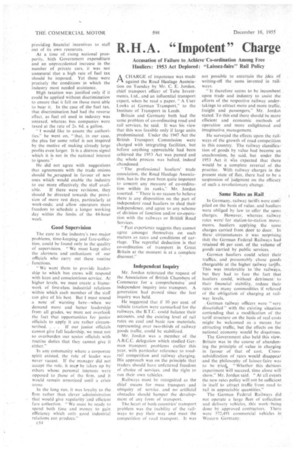R.H.A. "Impotent" Charge
Page 54

If you've noticed an error in this article please click here to report it so we can fix it.
Accusation of Failure to Achieve-Co-ordination Among Free Hauliers: 1953 Act Deplored: "Laissez-faire" Rail Policy ACHARGE of impotence was made against the Road Haulage Associa
tion on Tuesday by Mr. C. E. Jordan, chief transport officer of Tube Investments, Ltd., and an influential transport expert, when he read a paper, "A User Looks at German "FranspOrt." to the Institute of Transport in Leeds.
Britain and Germany both had the same problem of co-ordinating road and rail services, he said. It was his view that this was feasible only if large units. predominated. Under the 1947 Act the British Transport Commission were charged with integrating facilities, but before anything appreciable had been achieved the 1953 Act was passed and the whole process was halted, indeed
abandoned.
"The professional hauliers' trade association. the Road Haulage Association, has in the past been quite impotent to concert any measure of co-ordination within its ranks,'! Mr. Jordan asserted. "There is no reason 'to believe there is any disposition on the part of independent 'road hauliers to shed their independence, and agree to any scheme of division of function and/or co-operation with the railways or British Road Services.
" Past experience suggests they cannot agree amongst themselves on such matters as rates and conditions of carriage. The regretful deduction is that co-ordination of transport in Great Britain at the moment is at a complete discou •
Independent Inquiry
Mr. Jordan. reiterated the request of the Association of British Chambers of Commerce for a comprehensive and independent inquiry into transport. A generation had passed since the last inquiry was held.
He suggested that if 10 per cent. of vehicle taxation were earmarked for the railways, the B.T.C. could balance their accounts, and the existing level of rail rates on coal and basic raw materials, representing over two-thirds of railway goods traffic, could be stabilized.
Mr. Jordan was a member of the A.B.C.C. delegation which studied German transport problems earlier this year, with particular reference to roadrail competition and railway charging. His approach was on the principle that traders should have unfettered freedom of choice of services, and the right to run their own vehicles.
.Railways must be recognized as the chief means for mass transport • and ubiquity of seryice. and no artificial obstacles should hamper the development of any form of transport.
The heart of both cottntrics transport problem was the inability of the railways to pay their way and meet the competition of road transport. It was not possible to entertain the Idea of writing-off the sums invested in railways.
"It therefore seems to he incumbent upon trade and industry to assist the efforts of the respective railway undertakings to attract more and more traffic, .
freight and passengers," Mr. Jordan stated, To this end there should be more efficient and economic methods of operation and more enlightened and imaginative management.
He surveyed the effects upon the railways of the growth of road competition
in this country. The railway classifica-
tion of goods by value had become an anachronism, he said, but under the
1953 Act it w-as expected that there
would be a complete reversal of the practice. With railway charges in the
present state of .flux, there had to be a suspension or judgment on the efficacy of such a revolutionary change.
Same Rates as Rail In Germany. railway tariffs were cod"piled on the basis of value. and hauliers were obliged by law to offer the same charges. However, whereas railway rates were for station-to-station move-. ments, hauliers applying the same charges carried from door to door. In these circumstances it was surprising that the German Federal Railways had retained 46 per cent, of the volume of goods carried by public services.
German hauliers could select their traffics. and presumably chose good.:: chargeable at the higher rfailway tariffs. This was intolerable to the railways, but they had to face the fact that hauliers could, without detriment to their financial stability, reduce their rates on many commodities if relieved of the obligation of charging at railway levels.,
German railway officers were "very dissatisfied with the existing situation contending that a modification of the tariff structure on the basis of real costa might be Welcomed as a means for attracting traffic, but the effects on the national, economy would he disastrous.
The Government also held this view. Britain was in the course of abandoning the principle of value in charging in favour of that of cost. Crosssubsidization of rates would disappear and the philosophy of laissez-faire was to be tried, "Whether this dubious experiment will succeed, time alone will •
show." Mr. Jordan said. "At all events the new rates policy will not he sufficient in itself to attract traffic from road to rail in appreciable quantities."
The German Federal Railways did not operate a large fleet of collection and delivery vehicles, this work 'being done by approved contractors. There were 572,491 commercial vehicles in Western Germany.
















































































































